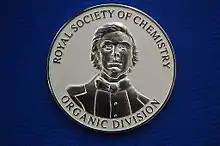Hickinbottom Award
The Hickinbottom Award (also referred to as the Hickinbottom Fellowship) is awarded annually by the Royal Society of Chemistry for contributions in the area of organic chemistry from researchers under the age of 35. The prize winner receives a monetary award and will complete a lecture tour within the UK.[1] The winner is chosen by the awards committee of the Royal Society of Chemistry's organic division.

Award history
The award was established by the Royal Society of Chemistry in 1979 following Wilfred Hickinbottom's bequest. Hickinbottom was noted for supporting high standards in experimental chemistry.
Part of the monetary award is the Briggs scholarship, which was funded following a bequest from Lady Alice Lilian Thorpe, William Briggs' daughter.[1]
Previous recipients
The award was first granted in 1981 to Steven Ley and Jeremy Sanders.[2][3]
Subsequent recipients include: [4]
| 2020 | Jordi Burés, University of Manchester |
| 2019 | |
| 2018 | William Unsworth, University of York |
| 2017 | Andrew Lawrence |
| 2016 | Stephen Thomas |
| 2015 | John Bower[5] |
| 2014 | Stephen Goldup[6] |
| 2013 | Oren Scherman |
| 2012 | Rachel O'Reilly |
| 2011 | Hon Wai Lam |
| 2010 | Matthew L. Clarke |
| 2009 | Gregory L. Challis |
| 2006-8 | Jonathan Paul Clayden |
| 2000-2 | Guy Charles Lloyd-Jones |
| 1996-7 | Varinder Aggarwal, Susan E. Gibson |
| 1994-5 | Richard F. W. Jackson |
| 1993-4 | Nigel Simon Simpkins |
| 1992-3 | David Gani, Philip Page |
| 1991-2 | Chris Abell |
| 1990-1 | Timothy Charles Gallagher |
| 1989-90 | Ian Paterson |
| 1988-9 | David Parker |
| 1987-8 | John A. Robinson |
| 1986-7 | Christopher J. Moody |
| 1985-6 | Richard J. K. Taylor |
| 1984-5 | Stephen G. Davies |
| 1983-4 | Philip J. Kocienski |
| 1982-3 | Eric James Thomas |
| 1981-2 | Steven V. Ley, Jeremy K. M. Sanders |
See also
References
- "Hickinbottom Award". Royal Society of Chemistry.
- "Prizes and awards". Steven Ley.
- "Prizes and honours". Jeremy Sanders.
- "Previous winners". Royal Society of Chemistry.
- "RSC Hickinbottom Award 2015 Winner". Royal Society of Chemistry. 5 May 2015. Retrieved 26 May 2015.
- "Queen Mary chemist wins prestigious Royal Society of Chemistry Award". Queen Mary University of London.